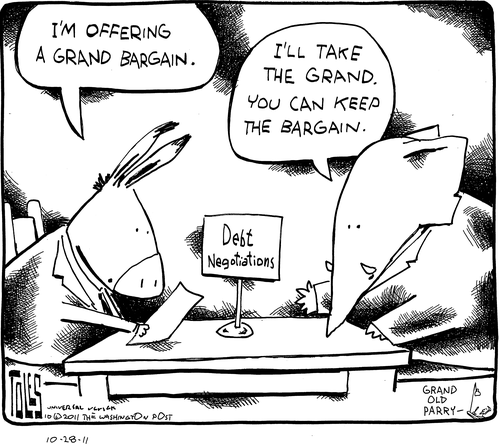One of the reasons that the Republicans lost so badly in 2006 and 2008 and the reason the Democrats took such a dive in 2010 was the economy. Since then the job approval rating of Congress has plummeted with the Republicans fairing worse than the Democrats but only slightly. In regards to the economy the public in general doesn’t think that President Obama is doing such a great job, either. People are worried about jobs, good jobs not deficits. Deficit and the national debt are not what is holding back the economy, it’s jobs.
The Republicans in the House seem to be intent on killing more jobs with its latest suicide pact that would cut everything from taxes for the wealthy, food stamps, destroy Medicare, and spending cuts. As Roger Hicky in his Huffington Post article point out, the Republican budget clearly rejecting what the American public wants.
The only thing that could save Republicans would be if Democrats, like Oregon Senator Ron Widen or House Democratic Whip Steny Hoyer, persuaded their party to ignore American public opinion and join with the GOP in destroying Medicare, cutting Social Security, and slashing public spending in a way that cripples the economy and rewards the wealthy. That’s what the Ryan Republican budget would do, and Democrats — and Americans who believe in majority rule — need to explain the extreme nature of this budget to the American people. [..]
So, the brand-new Ryan Republican budget, so very like last year’s Ryan budget, is already unpopular with the American majority, in all of its major elements. Progressives and Democrats should immediately publicize its many unpopular pieces so the public knows about them all. We should immediately demand to know whether the Republican candidates for president embrace it. And we should keep a wary eye out for Democrats who are willing to give the Republicans cover. When the Paul Ryan Republicans — enemies of everything the American majority believe in — are putting a gun to their heads and are about to pull the trigger, progressives should get out of the way and publicize the results — from now until the November elections.
It is obvious from the results of these kinds of cuts in Europe, austerity budgets don’t work. The Occupy Wall Street movement changed that conversation six months ago.
If Obama and the Democrats are smart, they’ll listen to the American public, sit back and let the Republicans pull the trigger.
Up Date: Ezra Klein, writing in the Washington Post, sums up Ryan’s latest version of a “budget plan” in one sentence:
Ryan’s budget funds trillions of dollars in tax cuts, defense spending and deficit reduction by cutting deeply into health-care programs and income supports for the poor.
The last I checked that isn’t going to win them any elections but you never know when the Democrats will ride into save the day. Calling Ron Wyden.

 The deadline for the bicameral Super Committee to come up with a deal on deficit reduction is a week away. While many
The deadline for the bicameral Super Committee to come up with a deal on deficit reduction is a week away. While many
Recent Comments